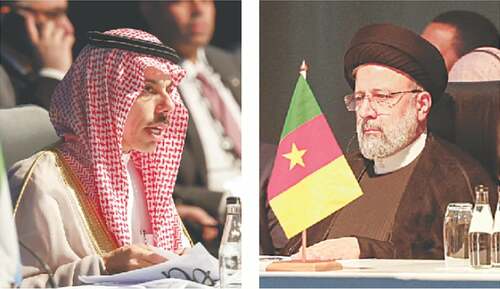WASHINGTON: The United States is racing to improve its messaging to the developing world as the BRICS group grows, although few in Washington view an immediate threat from the Chinese-backed club.
The BRICS — Brazil, Russia India, China and South Africa — agreed at a summit last week to add six more members, in what Chinese President Xi Jinping billed as a historic moment among large emerging economies contesting the Western-led order.
As the BRICS leaders met in Johannesburg, President Joe Biden’s administration renewed promises to step up funding for the developing world through the World Bank and International Monetary Fund.
Biden’s national security advisor, Jake Sullivan, vowed to fight to reform the Washington-based lenders at an upcoming summit in New Delhi of the Group of 20 — boosting the roles both of the US-backed organisation and of India, a key member of both clubs.
The United States has also been highlighting Russia’s withdrawal from a UN-backed deal to allow grain exports from Ukraine to the developing world, where some countries have questioned the Western priority of sending billions of dollars in weapons to Kyiv.
Publicly, Washington played down the BRICS expansion, saying only that countries can choose their own partners.
Sullivan, noting the wide policy differences among the countries, earlier told reporters, “We are not looking at the BRICS as evolving into some kind of geopolitical rival to the United States or anyone else.”
But experts said the BRICS expansion at least showed demand for a new way to address unmet needs, on the economic if not security front.
Emerging nations are “looking for alternatives, not replacements” to the US-led order, said Sarang Shidore, director of the Global South programme at the Quincy Institute, which advocates a less military-focused US foreign policy.
“It’s a message to the United States that these gaps are hurting and our countries are not just complaining about them or carping from the sidelines, but actually taking action to try and fill these gaps,” he said.
“I think the US is starting to take it seriously,” Shidore said of developing countries’ concern. “But those are statements — is there money attached to it?”
For Washington, the most concerning addition to the BRICS is Iran, which has hailed membership as a way to break out of US-driven isolation over the clerical state’s contested nuclear work and clampdown on protesters.
But the new members do not see eye to eye. Also joining are three Arab countries with historically rocky ties with Iran — Egypt, Saudi Arabia and the UAE.
Conspicuously absent from the BRICS expansion was any Southeast Asian country — despite Indonesia’s leadership in the Cold War-era Non-Aligned Movement — at a time that China has been increasingly assertive on maritime disputes.
Published in Dawn, August 30th, 2023














































Dear visitor, the comments section is undergoing an overhaul and will return soon.